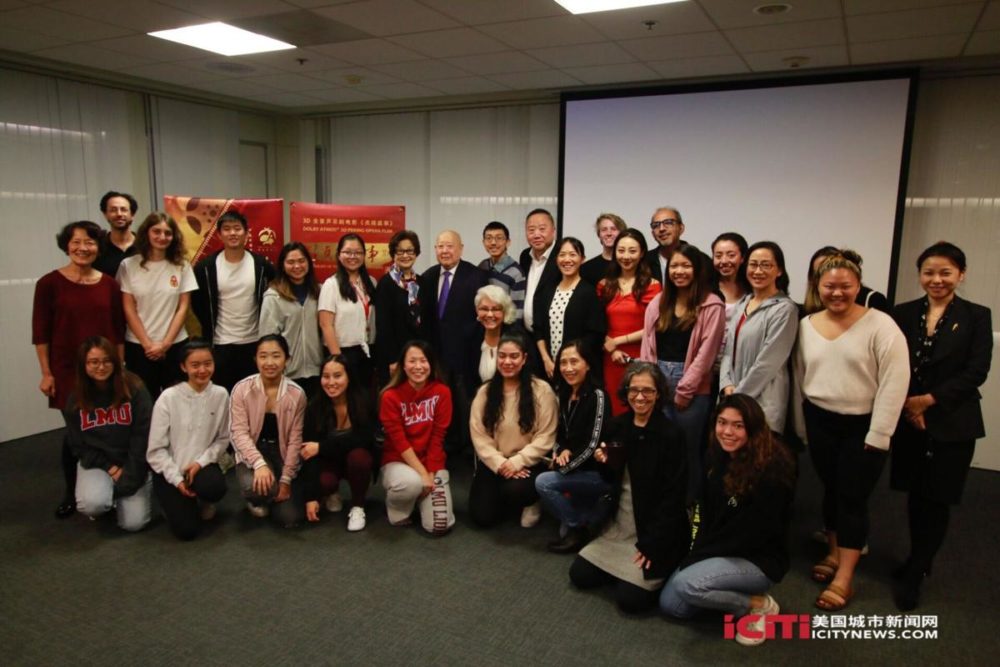
This article previously appeared in the Los Angeles Loyolan on November 13, 2019.
By: Michael Carandang
Acclaimed director Teng Junjie and Peking opera master Shang Changrong appeared on campus to discuss the film and the cultural relevance of Peking opera. The screening was held in University Hall at the McIntosh Center on Nov. 4.
“The Height of the Early Tang” shows an event from about 1,400 years ago during the Tang Dynasty through a Peking opera performance. One of the main characters, the loyal official and minister Wei Zheng, portrayed by Shang Changrong, reports on the decadent lifestyle found in the dynasty. A few problems Wei Zheng cites are the large number of palace girls in the courtyard of the emperor and the lavish residences of court officials. He pleads with the current Emperor Li to set a good example for the people and to address these problems. The emperor, egged on by his brother Zhang Ju Ji and other court ministers, becomes angered by Wei Zheng’s insolence and expels him from the court. After reflecting on their long friendship and persuasion by the court ladies, eventually Emperor Li and Wei Zheng work together to create the prosperous Tang dynasty.
At the reception, Ethan Olsen, a sophomore Asian and Pacific Studies major, said he was interested in attending the event to “learn more about Chinese culture.” He also talked about how the Chinese department always “puts on really good events,” which he said are always relaxed and usually include a reception with great Chinese food.
Teng and Shang discussed how the film drew upon the ancient Chinese philosophy found in Peking opera.
Teng pointed out that Peking opera includes plenty of lessons both from Chinese history and culture that still apply today. He mentioned a few pieces of advice that one should learn from the film, such as “When you are successful, it’s best to stay clear-headed and don’t be over indulgent … it will prevent one from making more enemies.” Teng also said, “A leader should be humble and be a team player. The previous emperor’s dynasty was destroyed because he lost all his support and was defeated by his enemies.”
Brian Lim, a sophomore marketing major, said that he was drawn to Peking opera since watching “Dance of the War God,” featuring the character Guang Gong. Lim said that “Peking opera is more interesting than Western opera.”
Two topics Teng and Shang discussed were the influences of Peking opera and the direction Peking opera will take in the future.
When asked about his outlook on the future of the opera, Shang said, “One of the reasons Peking opera has lasted so long is due to the fact that Chinese opera gets to the core of human nature and puts it on display with the particular flair and nuance found in the singing and movements of the art form.”
Recalling the words of Mei Lanfang, another world-class Peking opera artist, Shang discussed how film is transforming the way Peking opera is being spread. He said that it’s very tiring for a Peking opera performer to travel around the world and perform on stage, but with the hard work of directors like Teng Junjie, anyone can watch them at the cinema. In this way, Shang described Peking opera as “a gift you can give to the whole world, displaying the proud history of 4,000 years of Chinese culture.”
Director Teng Junjie agreed, stating one of the reasons that he chose to film movies in the Peking opera style and work with acclaimed master Shang Changrong is because Teng was “paying tribute to the quintessence of Chinese culture.” He added that “to record this art form in cinema will allow it to last longer and trigger more interest,” both domestically and abroad.
Samatha Chiu, a junior psychology major, said the event was a “great opportunity to meet a Peking opera artist” with over 70 years of experience.
At the end of the event, Shang, representing the Shanghai Jingju Theatre Company, extended an invitation to the students of LMU to visit Shanghai, watch Peking opera and try on the costumes and makeup that the performers wear.



